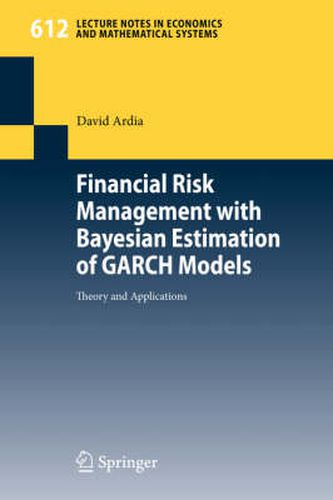Readings Newsletter
Become a Readings Member to make your shopping experience even easier.
Sign in or sign up for free!
You’re not far away from qualifying for FREE standard shipping within Australia
You’ve qualified for FREE standard shipping within Australia
The cart is loading…






This title is printed to order. This book may have been self-published. If so, we cannot guarantee the quality of the content. In the main most books will have gone through the editing process however some may not. We therefore suggest that you be aware of this before ordering this book. If in doubt check either the author or publisher’s details as we are unable to accept any returns unless they are faulty. Please contact us if you have any questions.
This book presents in detail methodologies for the Bayesian estimation of sing- regime and regime-switching GARCH models. These models are widespread and essential tools in n ancial econometrics and have, until recently, mainly been estimated using the classical Maximum Likelihood technique. As this study aims to demonstrate, the Bayesian approach o ers an attractive alternative which enables small sample results, robust estimation, model discrimination and probabilistic statements on nonlinear functions of the model parameters. The author is indebted to numerous individuals for help in the preparation of this study. Primarily, I owe a great debt to Prof. Dr. Philippe J. Deschamps who inspired me to study Bayesian econometrics, suggested the subject, guided me under his supervision and encouraged my research. I would also like to thank Prof. Dr. Martin Wallmeier and my colleagues of the Department of Quantitative Economics, in particular Michael Beer, Roberto Cerratti and Gilles Kaltenrieder, for their useful comments and discussions. I am very indebted to my friends Carlos Ord as Criado, Julien A. Straubhaar, J er ^ ome Ph. A. Taillard and Mathieu Vuilleumier, for their support in the elds of economics, mathematics and statistics. Thanks also to my friend Kevin Barnes who helped with my English in this work. Finally, I am greatly indebted to my parents and grandparents for their support and encouragement while I was struggling with the writing of this thesis.
$9.00 standard shipping within Australia
FREE standard shipping within Australia for orders over $100.00
Express & International shipping calculated at checkout
This title is printed to order. This book may have been self-published. If so, we cannot guarantee the quality of the content. In the main most books will have gone through the editing process however some may not. We therefore suggest that you be aware of this before ordering this book. If in doubt check either the author or publisher’s details as we are unable to accept any returns unless they are faulty. Please contact us if you have any questions.
This book presents in detail methodologies for the Bayesian estimation of sing- regime and regime-switching GARCH models. These models are widespread and essential tools in n ancial econometrics and have, until recently, mainly been estimated using the classical Maximum Likelihood technique. As this study aims to demonstrate, the Bayesian approach o ers an attractive alternative which enables small sample results, robust estimation, model discrimination and probabilistic statements on nonlinear functions of the model parameters. The author is indebted to numerous individuals for help in the preparation of this study. Primarily, I owe a great debt to Prof. Dr. Philippe J. Deschamps who inspired me to study Bayesian econometrics, suggested the subject, guided me under his supervision and encouraged my research. I would also like to thank Prof. Dr. Martin Wallmeier and my colleagues of the Department of Quantitative Economics, in particular Michael Beer, Roberto Cerratti and Gilles Kaltenrieder, for their useful comments and discussions. I am very indebted to my friends Carlos Ord as Criado, Julien A. Straubhaar, J er ^ ome Ph. A. Taillard and Mathieu Vuilleumier, for their support in the elds of economics, mathematics and statistics. Thanks also to my friend Kevin Barnes who helped with my English in this work. Finally, I am greatly indebted to my parents and grandparents for their support and encouragement while I was struggling with the writing of this thesis.